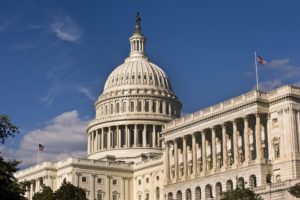
As you know, we’ve been following the online sales tax debate for years. From the Marketplace Fairness Act to states taking matters into their own hands, it’s been interesting to follow as lawmakers debate how to handle imposing state sales tax on internet retailers. It’s especially difficult given the wide variety of taxes and fees that would need to be imposed at a state, county and city level.
New Online Sales Tax Bill: No Regulation Without Representation
The latest legislation coming from Washington DC is called the No Regulation Without Representation Act. Unlike previous bills, this one would actually remove the ability for states to collect online sales tax by essentially codifying the physical presence standard set in the US Supreme Court case Quill Corp v. North Dakota (1992). What would that mean for taxpayers? It would define physical presence (and that you have to have it in order for a state to impose its taxing scheme), as Quill did, and also likely create a de minimis threshold. The bill would essentially eliminate click through nexus standards and affiliate nexus rules currently being imposed by various states.
As The Hill explains, “[House Judiciary Committee Chairman Bob Goodlatte] said the bill would protect states’ rights. But other GOP lawmakers and Democrats expressed concern that the bill would hurt states’ budgets and authority.”
In fact, another article in The Hill actually reports Republicans are ‘clashing’ within their own party as well as with Democrats over it.
Those that support the bill contend, “One state imposing an online sales tax could violate another’s right to govern. A bookseller in Idaho selling on Amazon to a buyer in Texas, for example, could be hypothetically affected by an online sales tax in Texas.”
However, Senator Deb Peters believes the effect would actually be the opposite arguing, “The bill would negatively impact states’ ability to accrue revenue from sales tax as online commerce grows.”
Our Opinion of the Latest Online Sales Tax Legislation
We think the No Regulation Without Representation Act is interesting in that it is actually opposite of what most states would like to see happen. State governments are traditionally in favor of bills that maintain their own sovereignty versus over-reaching federal legislation. However, in the case of the online sales tax debate, the states want the federal government to intervene, while most consumers would be just as happy to keep the status quo – no collection of sales tax unless the retailer has nexus with the state in question.
It will be interesting to see how this debate continues to unfold. Contact us if you have questions about how online sales tax and nexus may impact your company, and follow me on LinkedIn for more news surrounding multi-state legislation!
Miles Consulting Group, Inc. is a professional service firm in San Jose, California specializing in multi-state tax solutions. Our firm addresses state and local tax issues for our clients, including general state tax consulting, nexus reviews, tax credit and tax incentive maximization, income tax and sales/use tax planning and other special projects. To learn more, contact us today at www.MilesConsultingGroup.com.


















